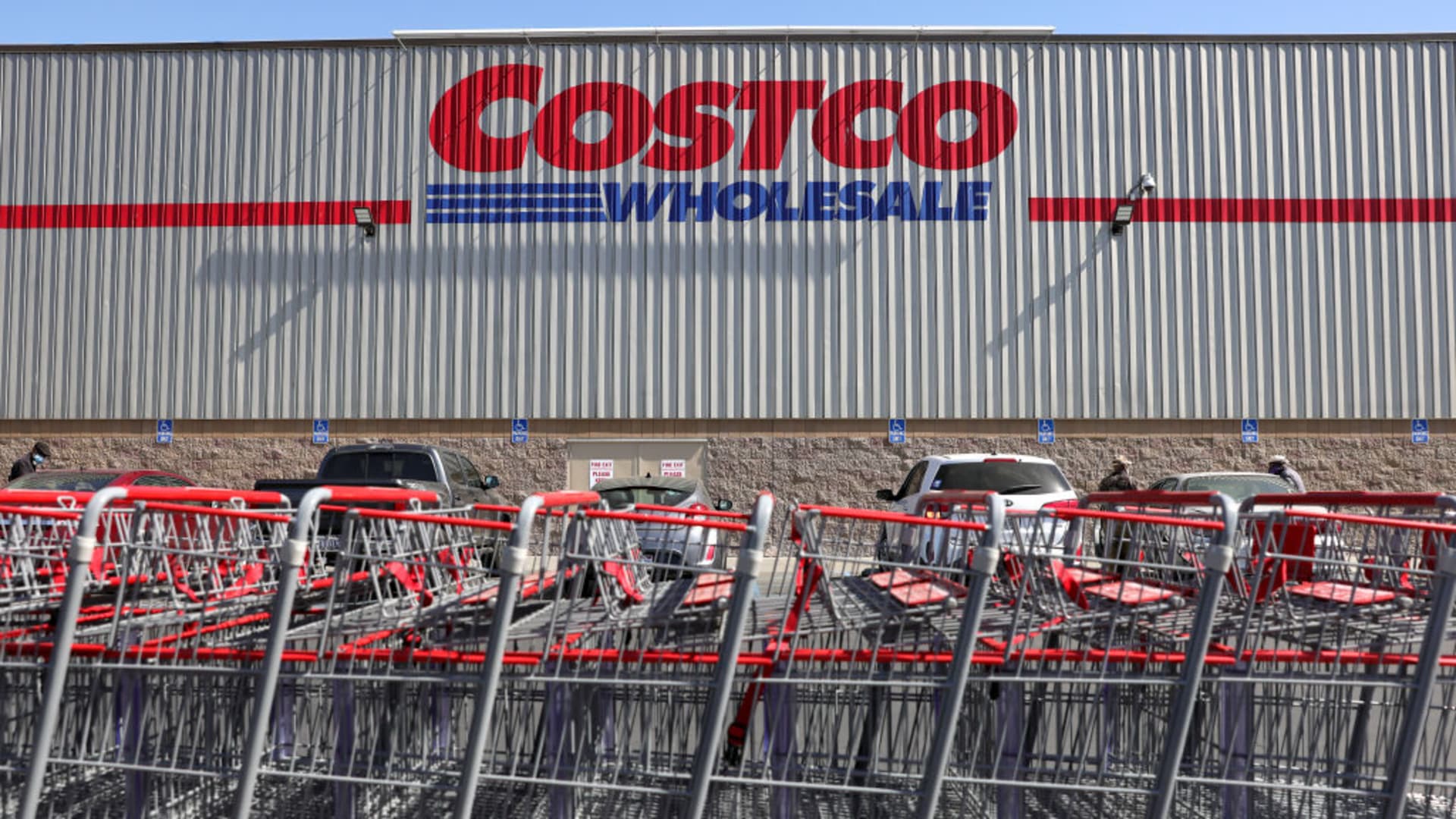
Costco (COST) reported a solid fiscal fourth quarter after the closing bell Thursday. Total revenue, which includes revenues from membership fees, increased 15% year over year to $72.09 billion, a slight beat compared to the consensus estimate of $72.04 billion. Earnings per share grew nearly 12% year over year to $4.20, beating estimates of $4.17. Over the full 16-week period, comparable sales in the United States increased 15.8% or 9.6% on an adjusted basis, which excludes the impact of gasoline prices and foreign exchange. In Canada, comparable sales increased 13.4% or 13.7% on an adjusted basis, while for the rest of international, comps increased 2.9% or 11.3% on an adjusted basis. E-commerce comparable sales increased 7.1% or 8.4% on an adjusted basis. For the total company, comparable sales increased 7.1% or 8.4% on an adjusted basis. Bottom line Costco shares were trading lower after-hours in reaction to the slight quarterly beats, but that’s typical of how Costco trades when it reports earnings. Costco doesn’t provide guidance but it does report its comparable sales on a monthly basis, Due to that monthly sales reporting structure, a lot of the good news gets priced-in ahead of the quarter. We continue to view Costco as a consistent, high-quality retailer with a fantastic business model that helps them to succeed in any economic environment. Inflationary, expansionary, or a recession, shoppers will always seek out the quality products at value prices Costco offers its customers. The stock may not be cheap by any measure, but we believe the premium is justified because of its dependable earnings growth. We continue to believe weakness in shares represents a long-term buying opportunity. Membership stats Revenue from membership fees is a closely followed metric because it is subscription based and is where Costco earns the majority of its profits. Membership fees increased 7.5% year over year to $1.33 billion, in-line with estimates of $1.321 billion. Foreign exchange had a $29.8 million negative impact. Costco ended its quarter with 118.9 million cardholders, an increase from 116.6 million total cardholders last quarter. Paid executive members ended the quarter at 29.1 million, up from 27.9 million last quarter. Renewal rates in the U.S. and Canada were 92.6%, a new all-time high. That’s up 0.3% from last quarter. The worldwide renewal rate was 90.4, up 0.4% from last quarter. Margins Merchandise gross margins on a reported basis were 10.18% and down 74 basis points from last year, but excluding the impact of gas inflation it would have been lower by only 20 basis points. Core merchandise margins fell 67 basis points on a reported basis and were down 23 basis points ex gas inflation. Sales mix was the primary driver of the decline because the wholesaler sold a lot of gasoline in the quarter, as you would expect, and that’s a lower margin product. Ancillary and other businesses’ margins increased 20 basis points on a reported basis and 34 basis points excluding gas inflation. Elsewhere, “2% reward” reported margins were flat on a reported basis and fell 5 basis points ex gas inflation. LIFO — last in, first out — margins fell 27 basis points on a reported basis and 29 basis points excluding gas. Other items The best-performing core categories in the fiscal fourth quarter were candy, frozen, kiosks, tire, lawn and garden, jewelry, toys, bakery, and deli. Costco opened up nine new net warehouses in the quarter, bringing the total for the full fiscal year to 26. Costco expects to open 29 new warehouses in fiscal 2023. The company estimated price inflation in the quarter was about 8%. That’s up from about 7% in the prior quarter. It’s a mixed picture, though, as Costco cited higher price inflation on food and sundries but a little lower on fresh foods. Wages are still higher. Costco is seeing commodities prices come down in areas such as gas, steel, beef, small changes in plastics, and also container pricing versus last year. The company hasn’t seen any discernable trend in its customers trading down. Potential catalysts As expected after Jim Cramer’s interview with CEO Craig Jelinek last week, management shot down the notion that an increase to its membership fee plan was imminent. Recall, that Costco historically has increased its membership fee every 5 to 5½ years. The 5½-year anniversary will be about January 2023, so let’s put this conversation on hold for at least a few more months. That being said, we believe Costco has the pricing power to increase its membership fees based on its customer loyalty and historically high renewal numbers. There was no talk about capital allocation and the cash on the balance sheet. We bring this up because Costco has paid out a special dividend four times in the past eight years, the last being in November 2020. (Jim Cramer’s Charitable Trust is long COST. See here for a full list of the stocks.) As a subscriber to the CNBC Investing Club with Jim Cramer, you will receive a trade alert before Jim makes a trade. Jim waits 45 minutes after sending a trade alert before buying or selling a stock in his charitable trust’s portfolio. If Jim has talked about a stock on CNBC TV, he waits 72 hours after issuing the trade alert before executing the trade. THE ABOVE INVESTING CLUB INFORMATION IS SUBJECT TO OUR TERMS AND CONDITIONS AND PRIVACY POLICY , TOGETHER WITH OUR DISCLAIMER . NO FIDUCIARY OBLIGATION OR DUTY EXISTS, OR IS CREATED, BY VIRTUE OF YOUR RECEIPT OF ANY INFORMATION PROVIDED IN CONNECTION WITH THE INVESTING CLUB. NO SPECIFIC OUTCOME OR PROFIT IS GUARANTEED.




